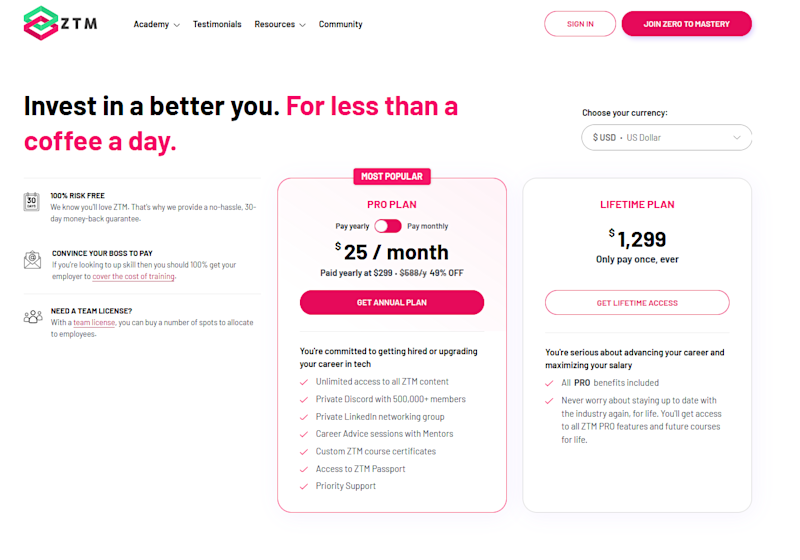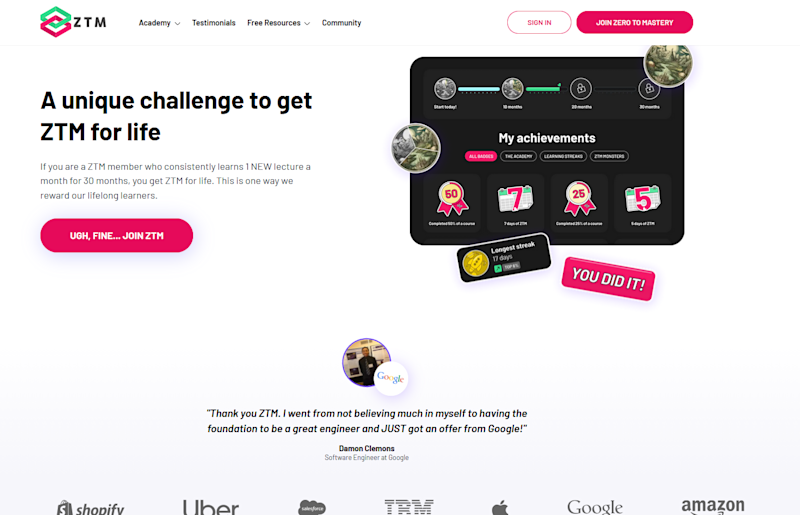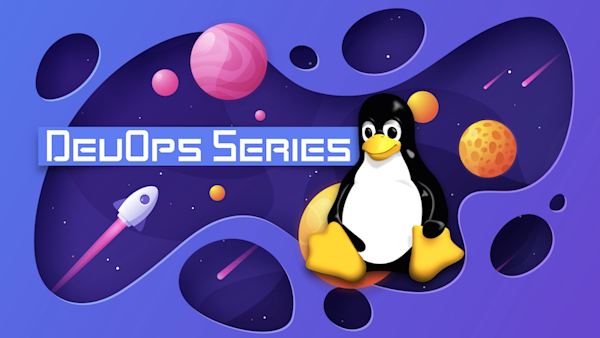It seems crazy, but tech is one of the few high-paying professional industries where you don’t need a degree to get hired.
You just need:
Easy right?
But how do you actually do that? How do you choose which career fits you, learn the skills for it, build a portfolio and practice for the interview?
In this guide I’ll break it all down step-by-step so you can start learning, building, and working your way into a tech career, with no degree required.
Let's get started.
Why tech doesn’t care if you have a degree
Sure, some people working in tech did go to university and learn the core concepts of computer science. Maybe they were curious about the academic side of things, or maybe they thought they needed it because that’s what companies like Google or Facebook used to ask for.
But the truth is, you don’t need a degree to get hired in tech anymore, and there are a few simple reasons why.
Reason #1. Tech moves fast
What you learn in year one of a degree might be outdated by the time you reach year four. That’s a long time to commit to something that might not even be relevant by the time you graduate.
Most companies would rather see that you’ve been learning in real time, building things, and staying current with new or complimentary skills.
Reason #2. Having a degree doesn’t mean you can actually do the work
Knowing theory is one thing, but being able to apply it is another. That’s why companies like Microsoft changed their approach years ago and started the whole 'no degree needed' trend. Instead of relying on degrees, they started focusing on portfolios and technical interviews.
Why?
They knew a lot of people learned on their own, but they also wanted to see if someone could think through problems and build things that work, not just talk about it.
Reason #3. You can learn the same information elsewhere, faster and cheaper
You can learn everything that’s taught in a computer science degree online. Even the core fundamentals like data structures, algorithms, and how systems work are all covered in courses that are easier to follow and far more up to date.
Online Computer Science Degree
15 milestones 13 courses
Learn all the modern skills of a Computer Science graduate + more!
Dive into different fields like Web Development, AI & Machine Learning, Data Science, Database Administration and Ethical Hacking
Get your online computer science degree and actually get hired
Earn on average per year:
$110,293
US salary data collected from Indeed, LinkedIn, and Web3.career 2026.
Most people learn this way now. They skip the lectures and overpriced textbooks, and follow a clear path instead, and they do it much faster.
No joke but you can go from starting out to job-ready in just a few months, without wasting years or racking up debt. So no, you don’t need a degree.
You do however have to learn the right skills, so let’s break down the options for picking these up.
The main paths into tech without a degree
There are 4 other potential paths to get into tech. We cover them in more detail in this guide here, but here's a mile high overview of each.
Option #1. Completely self-taught
Basically just learning for free with stuff you can find online, such as YouTube tutorials, documentation, projects etc.
A lot of people start here and it’s totally fine to learn this way, and it’s completely free. We even share the first few hours of some of our own courses on there, for people to start learning from.
For example
Here's the first 10 hours of our Machine Learning, Data Science and AI course:
Pretty handy right?
However, learning from free resources like this does come with some common issues:
The information can be outdated or incorrect. (We've updated the course multiple times since this video was published. It's still great, but you're missing new things)
It can be hard to know what to learn, in what order and how much
It can be hard to know when you’re ‘ready’ to apply for jobs
This happens so often that people have affectionately named it "tutorial hell".
Basically you’re unsure what you need to know, so you bounce around never finishing anything, or simply never applying for roles. And sure, some people get through it and learn to code for free but they are normally the outliers who are super motivated and organized.
What most people realize is that self taught is great for starting out but it's hard to progress, and so they start here and then move onto another option on this list.
Option #2. Online courses or learning platforms
Similar to being self taught in that you’re learning online, but rather than having to figure it all out yourself, you follow set courses and roadmaps to learn what you need to get all the skills and then hired.
It’s faster
It’s easier than trying to figure it out on your own
Courses are always updated
You have community support to help make sure you follow through and finish training
You learn the actual skills you need so you can get hired
And they are fairly cheap
For example
Here at Zero To Mastery, we have a few price options:
You can pay monthly at just $49 a month
Or pay $299 for a year if you pay in advance. (Working out at $25 a month).
Or you can pay $1,299 for lifetime access.

We even have a feature that I haven't seen any other learning platform offer, called our 'Lifetime challenge', and it's designed to help you succeed,.
How?
Because it rewards you for logging in and learning, so you actually follow through and finish your course!

Here's how it works: If you are a ZTM member who consistently learns 1 NEW lecture a month for 30 months, you get ZTM for life. This is one way we reward our lifelong learners.
Whichever option you choose, they all give you access to every single course in our library, so you can learn everything you need to know to get started, skill up, and get hired.
As for the courses themselves, each one is taught by an industry expert, who not only makes sure they are always up to date, but is available inside our private community to answer your questions.
But better still?
Because they work in the industry, they focus on teaching you exactly what you need to know to get hired asap, and cut out everything else. They basically say “What would the ideal hire for my department need?" and then make sure you get those skills.
This makes it so much faster to learn, because you’re not wasting time on things you don’t need to get you hired. That's why all of our courses only take a few months to complete, and we have thousands of testimonials of people starting with absolutely zero skill and then getting hired in under 6 months.
That's a big difference in cost and time spent to learn when compared to college degrees right!?
Speaking of degrees, we also have students who came to us after their college courses finished, because they were missing skills that they needed for a role.
While others joined ZTM who were self taught and got stuck. They take our courses and got more progress in 4 months than they did in 4 years on their own.
Heck, we even have people in senior roles at tech companies who take our courses so they can skill up into even more senior roles. That’s how good the stuff we teach is!
I know it sounds biased seeing as we’re a platform that teaches online, but honestly, online courses are the #1 way to get into tech. The barriers are low and you learn what you actually need.
There are other options though so let's cover those also.
Option #3. Bootcamps
Bootcamps are in person events designed to help you learn to code and hopefully get hired ASAP. You turn up on a set date and work with them each day alongside other bootcamp members, and try to learn everything in a few months.
Sometimes they will have direct industry connections with potential job offers at the end. However, the cost is steep. Not as much as a degree, but you’ll often see them at around $5,000 to $10,000 or higher.
Some are cheaper but will normally have a stipulation that they get X percent of your salary from your new role for the first X years as part of their payment. If you’re getting a 6 figure a year career and need that extra push to get finished these can definitely work and force you to take action.
Honestly though, it’s the same stuff you learn with us for just $49 a month instead.
Option #4. Apprenticeships or internships
These are less common but growing. They let you learn on the job, often while getting paid. Some companies now offer structured programs specifically for people without traditional backgrounds.
Honestly though, unless you’re looking to get your foot in the door in a place that's notoriously hard, I would skip them. You often end up underpaid and stuck in the lower earning role for much longer than you need to be.
Just learn what you need for the role instead in 6 months, and then jump right into a 6 figure a year job and skip the internships.
So, now you know the paths you can take, let’s look at how to decide which career you should go into.
How to choose the best tech career for you
There’s this myth that everyone in tech has to be a developer, love math, or be some kind of computer wizard, but that’s not true at all. In reality, the tech world is full of very different roles and many of them don’t involve coding.
The trick is to simply pick a role and start learning. But if you’ve never worked in tech before, how do you even choose?
Instead of guessing what sounds cool or trying to figure out which jobs are “better,” the easiest way to decide is to look at your existing strengths and interests, and see how they align with common roles:
What types of problems do you like solving?
What kinds of tasks energize you?
What do people usually come to you for?
We’ve covered all the different roles and who they best fit before in this guide here, but let’s give you a mile high overview so you can have a rough idea.
If you enjoy solving problems, working through logical steps, or understanding how things fit together, then you’ll probably enjoy Web Development
It’s one of the most direct ways to build a tech career, and it doesn’t require you to be a math genius or have years of experience. Think of it like building Lego with logic, in that you're piecing together ideas to make apps, websites, tools, and automation's work.
Fun fact, but we looked into job availability, and time to learn skills and being a web dev is actually the fastest path into getting a new job in tech without a degree. If you want to get started on it, check out the roadmap below:
Become a Fullstack Web Developer
13 milestones 9 courses
Step-by-step roadmap where you'll learn to code and build a portfolio.
Curated curriculum of courses, workshops, challenges, projects, and action items.
Become a Fullstack Web Developer from scratch and actually get hired.
Earn on average per year:
$115,887
US salary data collected from Indeed, LinkedIn, and Web3.career 2026.
If you're detail-oriented, love refining things, or enjoy getting processes running smoothly, then you might thrive in DevOps or Cloud Engineering
These roles are perfect for people who like understanding systems, setting up automations, or making things more efficient. Think behind-the-scenes work that helps developers release features faster, more reliably, and with fewer bugs.
DevOps Engineers focus on more traditional systems, while Cloud Engineers focus on doing the same but inside cloud platforms like AWS or Azure
The cool thing is, you don’t need to be a developer to start here either. Just a strong desire to make things work better. Click on any of the links to jump to the roadmaps and resources for these roles.
If you're creative, empathetic, and enjoy making things easy to use or visually appealing then UI/UX Design could be a great fit
Designers focus on how apps, websites, or platforms look and feel, and how real people interact with them. So if you find yourself frustrated by clunky websites or thinking “why isn’t this easier to use?", then this path was made for you.
No coding required, just curiosity about people and how they use technology.
Check out our UI/UX Design roadmap below:
Become a UI/UX Designer
12 milestones 7 courses
Step-by-step roadmap where you'll learn to code and build a portfolio.
Curated curriculum of courses, workshops, challenges, projects, and action items.
Become a UI/UX Designer from scratch and actually get hired.
Earn on average per year:
$109,533
US salary data collected from Indeed, LinkedIn, and Web3.career 2026.
If you love working with numbers, spotting patterns, or making sense of messy information then you’re probably a good fit for the data side of tech
Whether you want to generate insights for a business or go deep into machine learning, data-driven roles are high-paying and in demand.
Start with Data Analysis if you like turning data into charts and dashboards
Learn Data Science if you're interested in deeper modeling and high salaries
Learn Business Intelligence (BI) if you want to help predict business trends
Or learn Data Engineering if you enjoy building the systems and pipelines that make all of those data jobs possible. (It’s one of the most in-demand and well-paid paths in the data field)
If you’re fascinated by how computers “think” or want to build intelligent tools, then you’ll want to explore Machine Learning and AI
These fields are great for people who are curious, methodical, and want to build things that automate decisions or learn from data.
It’s a little more technical, but totally learnable if you like experimenting, testing, and solving puzzles with data.
Become a AI & Machine Learning Engineer
17 milestones 12 courses
Step-by-step roadmap where you'll learn to code and build a portfolio.
Curated curriculum of courses, workshops, challenges, projects, and action items.
Become a AI & Machine Learning Engineer from scratch and actually get hired.
Earn on average per year:
$195,425
US salary data collected from Indeed, LinkedIn, and Web3.career 2026.
If you’re protective by nature, cautious, or love solving mysteries then you might be perfect for Cyber Security
Cybersecurity isn’t just about firewalls and passwords. It’s about finding weaknesses before attackers do. Learning how they think and work, so you can fix things before they can become an issue.
It’s a mix of technical knowledge, investigative thinking, and constant curiosity. If you’ve ever wondered how hackers work, or how to stop them, then this path is for you:
Become a Ethical Hacker & Cybersecurity Expert
15 milestones 12 courses
Step-by-step roadmap where you'll learn to code and build a portfolio.
Curated curriculum of courses, workshops, challenges, projects, and action items.
Become a Ethical Hacker & Cybersecurity Expert from scratch and actually get hired.
Earn on average per year:
$126,653
US salary data collected from Indeed, LinkedIn, and Web3.career 2026.
If you're excited about crypto, decentralization, or cutting-edge tech then you should check out Blockchain development
Web 3.0 is the future of how the internet will work, and you can get in now on the ground floor. This is ideal for curious people who don’t mind learning something that’s still rapidly changing.
Become a Blockchain Developer
13 milestones 7 courses
Step-by-step roadmap where you'll learn to code and build a portfolio.
Curated curriculum of courses, workshops, challenges, projects, and action items.
Become a Blockchain Developer from scratch and actually get hired.
Earn on average per year:
$167,893
US salary data collected from Indeed, LinkedIn, and Web3.career 2026.
If you love tech but are more interested in mobile apps than websites, then Mobile development might be the perfect match
Mobile Development is all about building apps that live on your phone or tablet, whether it's a social media app, a fitness tracker, or a mobile game. You’ll learn how to create smooth, responsive experiences for users on the go.
You can build apps natively using languages like Swift (for iOS) or Kotlin (for Android), or you can use cross-platform tools like React Native or Flutter to build once and deploy everywhere. This makes it a really flexible skill set that’s in high demand across industries.
It’s a great path if you love clean interfaces, fast feedback loops, and working on products people interact with daily. And since nearly every business now needs a mobile presence, the job market here is huge.
Become a Mobile Developer
13 milestones 8 courses
Step-by-step roadmap where you'll learn to code and build a portfolio.
Curated curriculum of courses, workshops, challenges, projects, and action items.
Become a Mobile Developer from scratch and actually get hired.
Earn on average per year:
$109,976
US salary data collected from Indeed, LinkedIn, and Web3.career 2026.
If you want a versatile, long-term foundation in development, then you might be a great fit for Software Engineering
Software Engineering is one of the most flexible and future-proof paths in tech. You’ll learn how to build applications from the ground up.
It’s a great option if you want to eventually move into senior developer roles, architecture, or tech leadership. You won’t just learn how to write code, you’ll learn how to design and structure systems that are scalable, maintainable, and built for real-world complexity.
Become a Software Engineer
16 milestones 12 courses
Step-by-step roadmap where you'll learn to code and build a portfolio.
Curated curriculum of courses, workshops, challenges, projects, and action items.
Become a Software Engineer from scratch and actually get hired.
Earn on average per year:
$143,556
US salary data collected from Indeed, LinkedIn, and Web3.career 2026.
If you love storytelling, design, and interactive entertainment, you might be a great fit for Game development
Game Development is all about creating experiences, not just code. You’ll learn about engines like Unity or Unreal, and work on graphics, sound, and gameplay.
It’s ideal for creative minds who also enjoy problem-solving and building worlds.
Become a Game Developer
10 milestones 8 courses
Step-by-step roadmap where you'll learn to code and build a portfolio.
Curated curriculum of courses, workshops, challenges, projects, and action items.
Become a Game Developer from scratch and actually get hired.
Earn on average per year:
$99,039
US salary data collected from Indeed, LinkedIn, and Web3.career 2026.
If you're excited about building smart tools that feel like magic, then you might be a great fit for AI Development
This role is all about using existing AI models such as LLMs, image generators, or recommendation systems, and integrating them into real-world products.
Unlike Machine Learning Engineers, AI Developers don’t need to train models from scratch. Instead, you’ll work with APIs, prebuilt models, and toolkits like OpenAI, Hugging Face, or TensorFlow to build apps that feel intelligent.
Become a AI Developer
20 milestones 17 courses
Step-by-step roadmap where you'll learn to code and build a portfolio.
Curated curriculum of courses, workshops, challenges, projects, and action items.
Become a AI Developer from scratch and actually get hired.
Earn on average per year:
$155,257
US salary data collected from Indeed, LinkedIn, and Web3.career 2026.
Still not sure?
I know that's a lot to take in, so if you’re still not sure the best option for you, then go ahead and take our tech career path quiz.
Want a career in tech but not sure what to do?
- Find the perfect career path for you based on your experience and goals
- Get a personalized step-by-step roadmap to follow
- Go from zero to hired in your dream career
- 👇 Take our free, 2-minute quiz to make it happen
It asks a few simple questions and helps match your personality to a role that fits so you don’t have to figure this all out.
Just focused on salary?
Alternatively, if you just want to make bank and don’t really care which area to focus in, then check out this guide to the highest-paying tech jobs so you can pick based on earning potential instead. Simple!
So what’s next?
Well once you’ve decided on a role and gone through and learned the skills, you need to apply for jobs and pass the interview.
How to pass the tech interview
Remember how I said at the start that the tech industry is different and you don’t need a degree - just the skills and proof that you can do what you say?
Well because of that, the interview process at tech companies is different to most roles. We go into it in full detail here along with other tips to pass the tech interview.
We also have courses on this, as well as other tips for the entire job application process:
However, let's cover some of it here so you get the basics.
There’s usually 4 stages to the tech interview process:
#1. First, you apply online
You’ll submit a short application and include a portfolio or GitHub link that shows off your best work. If you’ve followed one of the career roadmaps from the links above then this part will be easy, because every course in those roadmaps includes real projects you can use to show you know what you’re doing.
#2. Next, some companies will ask you to take a short quiz
These are usually multiple-choice questions meant to filter out applicants who don’t understand the basics. It’s not a trick. They’re just checking that you actually know the fundamentals before you talk to a human.
#3. Then comes the technical interview
This is where they ask you questions about the skills for the role. You might talk through a past project, solve a simple problem, or walk through your thought process step by step.
The goal isn’t to be perfect, but to instead show that you understand the topic and can think logically under pressure.
#4. Finally, you’ll have a behavioral interview
This is more like a traditional job interview. You’ll meet the team, talk about how you work, and make sure it’s a good fit on both sides.
You don’t need a degree, you just need to start!
So as you can see, getting into tech without a degree really isn’t that hard.
You simply:
And sure, tech interviews are more in depth than any interview you’ve done before, but that's why they can let people sidestep the degree, which is a pretty good deal if you ask me!
The key of course is taking that first step. So if you're still now sure the best option for you, go ahead and take our tech career path quiz right now to find the best option for you.
Want a career in tech but not sure what to do?
- Find the perfect career path for you based on your experience and goals
- Get a personalized step-by-step roadmap to follow
- Go from zero to hired in your dream career
- 👇 Take our free, 2-minute quiz to make it happen
It'll give you the roadmaps along with what to learn, in what order, to get hired ASAP.
Then email me once you’re got that new tech job to be a featured success story on the blog! 😉.
Best articles. Best resources. Only for ZTM subscribers.
If you enjoyed this post and want to get more like it in the future, subscribe below. By joining the ZTM community of over 100,000 developers you’ll receive Web Developer Monthly (the fastest growing monthly newsletter for developers) and other exclusive ZTM posts, opportunities and offers.
No spam ever, unsubscribe anytime












